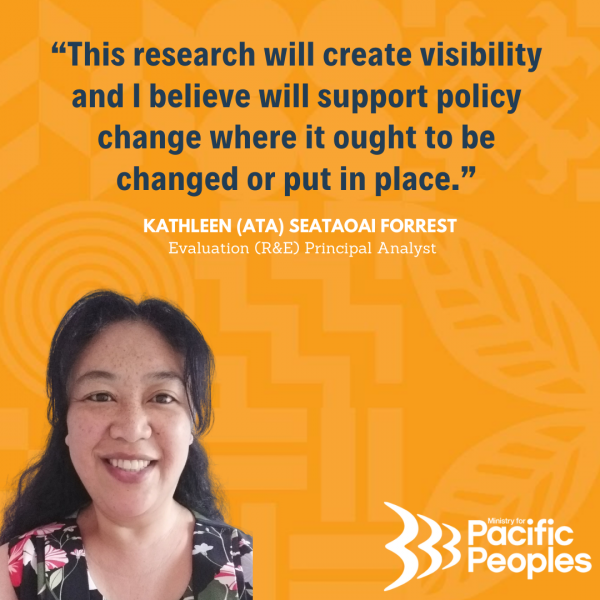Research project hits close to home
Research project hits close to home

The Pacific Economy Research Project is more than just a work assignment for Ministry for Pacific Peoples (MPP) Research and Evaluation (R&E) Principal Analyst Kathleen (Ata) Seataoai Forrest.
Pacific’s contribution to the New Zealand economy through unpaid work and other activities is something she holds close to her heart.
Ata has worked at MPP for nearly six years in the R&E space, which she says hasgrown and flourished over time – especially since the arrival of the R&E Director Dr ‘Ana Koloto.
“The R&E space allows us to build evidence-based data to support decisions, it also helps to translate our Pacific peoples voices into data that can speak across different forums,” Ata says.
“It’s an exciting time for R&E at the Ministry.”
A key project for the R&E team is the Pacific Economy Research Project, which aims to better understand the Pacific informal economy, with a particular focus on exploring the type of unpaid productive work and volunteering that contribute to wellbeing and wealth development in New Zealand.
After engaging with focus groups and conducting interviews, Ata says she believes this research will help highlight the value on what Pasifika communities do to contribute to the New Zealand economy.
“Traditionally people think being employed and working is a contributing factor to building the economy – but there are other unpaid activities that are just as important.
“The current issue is what Pasifika communities do day in and out in an unpaid capacity is invisible and yet crucial.
“Bigger organisations get paid to do the same work but do not have half the impact our communities have and yet they carry the load because no one else will.”
How Pacific people define what is unpaid work is important too and this research will also highlight this, Ata adds.
“This research will create visibility and I believe will support policy change where it ought to be changed or put in place.”
Born in Samoa but raised in New Zealand, Ata’s parents moved across the Pacific to pursue the dream of all Pasifika families – to look for better opportunities for their family and children, she explains.
Married with two children, and one on the way, Ata’s family attend a Samoan church, where they have committed a lot of time of unpaid activities over many years.
“But we enjoy it - it gives us purpose, a sense of belonging and a desire to enrich our communities and New Zealand,” she says.
Ata says her family is no different to so many other Pacific families around the country – pouring in countless unpaid hours to support other family members, friends and church communities.
“It is these through these efforts where you see thriving Pacific churches, children who know their roots, New Zealand-born kids who have an understanding of the sacrifices their parents made to give them a good life and act on it to build for themselves and their families a better future.”
Ata shares a Samoan proverb she recently read.
“’Ua le tunoa faiva o Samea’ – the work (fishing trip) of Samea is not haphazard - it expresses things happen for a reason or has a purpose.
“For me that speaks to what my family and countless many Pasifika have done to secure a place for them here in Aotearoa – this includes many countless hours and money into building a community that come together to support each other for wellbeing in all areas of life.”
Pacific peoples have come to New Zealand with the purpose to build a better life and for their children to be blessed and Ata says in many ways, they have achieved this.
“However, their efforts are not always recognised and often come up against a system that does not support what works for them.
“So, for me – this project will aim to firstly build awareness and then my hope is that it will lead to transformation.”
As part of the project, a survey has been set up and the research team is asking Pacific peoples to complete it and take the opportunity to demonstrate to government and everyone else the value they bring to New Zealand.
“It is important people give their voice in this space and take part – whether it be through a talanoa or survey,” Ata says.
“From an R&E perspective, as this project utilises the Kakala method to undertake the project I hope we reach the level of ‘mafana’, that is, this project leads to transformational change in the way people think about unpaid work from a Pacific perspective and it transforms decision makers in how they invest to allow Pasifika to continue to thrive and enrich Aotearoa.”
The survey closes at the end of February.
